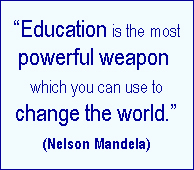| Our Response
IDP works to improve literacy and general levels of education in rural areas of Ethiopia. We do this by:
- providing rural schools with classroom furniture and essential writing materials from the UK,
- rehabilitating and improving existing classrooms,
- providing clean water and sanitation facilities and
- supplying much needed books, equipment and supplies.
All this means that more rural children can go to school.
 The level of education has a direct influence on the spread of diseases and the acceptance of health practices. As 85% of the Ethiopian population exists on subsistence farming, the majority of the children do not have access to mainstream education. The level of education has a direct influence on the spread of diseases and the acceptance of health practices. As 85% of the Ethiopian population exists on subsistence farming, the majority of the children do not have access to mainstream education.
There is a shortage of school classrooms (especially among rural communities) and often the existing buildings are dilapidated. In many schools there is insufficient furniture and a lack of basic education materials. Simple pens, pencils and exercise books are scarce and there is weak institutional capacity. Staff receive insufficient training and there is limited community involvement in the management of schools.
The school schedule conflicts with the work schedules of many children and their families, and teachers do not have the necessary support and materials to successfully implement the curriculum. Moreover, sending children to school is too expensive for communities with very low economic status.
Given the importance to developmental activity of literacy and of appropriate educational attainment, the capacity of local schools in Ethiopia can be enhanced by improved access to books, desks, tables, chairs, writing materials, etc. To provide outdated computer equipment opens up new horizons among people who rarely have access even to basic technology.
Teachers in Ethiopia lack the material support necessary to deliver effective education to young children and IDP is working with existing education structures to improve access to materials and information thereby improving the quality of the learning environment and level of teaching.
Literacy is clearly an area of major importance and we aim to equip community leaders, especially in rural areas of the country, in combating poverty and isolation through the education of children and young people.
As gender and regional disparity continues - perhaps getting wider – one of our main aims is to improve equity by narrowing enrolment gaps for girls and boys, and for rural and urban communities. |



